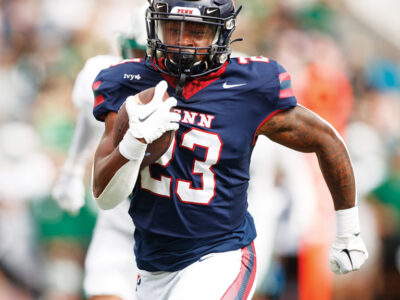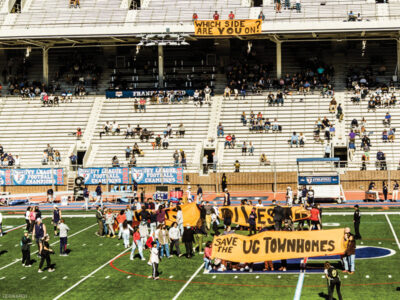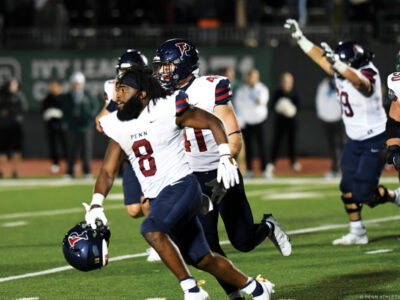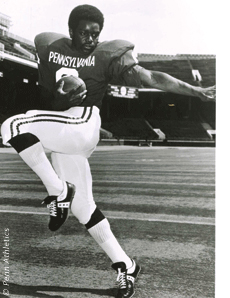
Martin Vaughn W’75 WG’81 wiped away a single tear just before it reached the corner of his mouth, and gazed out onto the glistening Franklin Field turf.
A few yards in front of the alumni tent where he and many of his old teammates had gathered to honor an old friend, Vaughn looked on as the Penn football team dismantled rival Princeton en route to a 37-9 Homecoming victory. It was a convincing win filled with standout performances from talented athletes. But for Vaughn, there was no one on the field like Adolph Bellizeare C’75, the Penn football legend who died last April from a heart attack.
“Adolph was the greatest running back ever to play the game at this University,” said Vaughn, a former Penn quarterback and Bellizeare’s best friend and teammate. “When I say that, I mean Adolph can walk out on this field right now. And he could be great right now.”
The 17,179 fans on hand for Penn’s November 5 Homecoming game had to settle for watching highlights of Bellizeare, who was honored with a stirring halftime ceremony. Following the electrifying video clips, which showed what Vaughn called Bellizeare’s “world-class speed” that was “unprecedented for someone in the Ivy League,” the late running back’s wife, Joanne Bellizeare C’76, and daughter, Brittany Bellizeare, were given a framed No. 6 jersey by athletic director Steve Bilsky W’71. Earlier in the day, a memorial tribute was held at College Hall, presented by the Black Alumni Classes of 1975-76.
“I’ve been going through emotion all year, since April 21 when he passed,” said Joanne, moments after the halftime ceremony. “Right now, this is a culmination of everything. I think finally now I have closure.
“I’m rejoicing now,” she added with a smile. “Adolph would have loved this.”
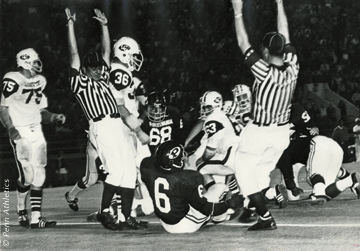
Although Penn never won an Ivy League championship during his tenure, Bellizeare left his mark on the football program in ways few other players have done before or since. Nicknamed “Beep Beep”—a reference to the speed and elusiveness of Looney Tunes’ Road Runner—Bellizeare amassed a school-record 4,004 all-purpose yards. He also ranks near the top of Penn’s record book in career rushing touchdowns (30) and career rushing yards (2,155), and was arguably one of the nation’s best kick returners during his time wearing the Red and Blue from 1972 to 1974.
“He was a special guy,” said Harry Gamble, Penn’s head football coach from 1971 to 1980. “He had great skills and a great competitive spirit about him. He was just a terrific football player. But he was more than that … His personality was just fantastic. He’d come into my office and I might be having a down day. But he’d say, ‘How you doin’, Coach,’ with that smile, and my whole day would begin to change.”
Bellizeare’s ex-teammates, friends, and family members all echoed Gamble’s sentiments that “Beep Beep” was more than just an extremely talented football player. According to Vaughn, he was a big man on campus who interacted with different types of students, as well as the school administration, and enjoyed the “total Penn experience.” Some even said that, during a time of great unrest on college campuses, he served as a bridge between Penn’s black and white students and was something of an ambassador for the University.
“Adolph was not only an athlete but he had everyone’s respect,” said Don Clune C’74, an All-American wide receiver who went on to play three seasons in the NFL. “In his own way, he was a black student leader who, at the time, was looked up to. That was, for me, one of the biggest parts of it.”
Following his graduation Bellizeare was drafted by the Minnesota Vikings, but never played in the NFL. Instead, he enjoyed a successful career in advertising, working for TV Guide, Time Life, and Comcast, while setting in Scotch Plains, New Jersey, with his wife and daughter. Vaughn said Bellizeare used the same kind of charismatic, aggressive, and confident personality he honed at Penn to succeed in business, although his wife admitted that his rough exterior sometimes rubbed people the wrong way—but only because “what he said was true to himself and true to you.”
“If you asked [for] advice, he’d tell you,” said Joanne, who first met her husband when the two were growing up in Braintree, Massachusetts, and started dating him at Penn. “Whether it made you cry, he’d tell you. His advice was real. You either liked him or you didn’t.”
Stopping for a minute and looking around at the crowded alumni tent where at least 30 of his old teammates had gathered, she added: “As you can see, most people loved him.”
There were, of course, many things to love about Adolph Bellizeare. Like how he would sing Rick James’ “You and I” to his friends, any time one of them was going through a rough patch. Or his renowned gumbo.
“The most memories I have are us laughing uncontrollably, or cooking—because he loved to cook,” said his 28-year-old daughter, Brittany, who enjoyed seeing all of the old Penn football players her father used to talk about. “The last Father’s Day I had with him, he finally let me take him out to dinner. Before that, he always had to cook.”
Vaughn remarked that even long after he and Bellizeare played together, the pair continued to feel like they were part of one another’s families. Shortly after Vaughn’s father was diagnosed with prostate cancer 15 years ago, Vaughn went over to his dad’s house to take him to another doctor. But when he arrived, he found his father on the back porch with Adolph, the two of them eating fried fish and drinking vodka in their underwear like nothing was wrong. When Vaughn asked what happened with the doctor, his father told him, “Well, they told me to bring one of my sons. I knew you were traveling. So I took Adolph.” When Vaughn tried to protest, his father said, “Shut up, take your clothes off, sit down, and let’s eat.”
Vaughn said he’d thought about that story a lot recently, ever since learning of his best friend’s unexpected passing. But it wasn’t until he got to Franklin Field that he began to picture Penn’s Homecoming game 38 years ago. He closed his eyes and saw the crowd in the stands, the football spiraling through the air, Adolph waiting on the goal line, the energy building, Adolph catching the ball, the energy building some more, Adolph running, running … and, just like that, he’s gone.
“Adolph was all about that electricity, that energy,” Vaughn said. “That’s what you take out of here today. You take that energy and you live it. You run with it. You share it. That’s what he’s all about. He’s not dead. He’s just a different form of energy. You’ve got to keep it with you.”
More tears began to well. Vaughn tapped his heart.
“He’s right here, always.”
—Dave Zeitlin C’03


